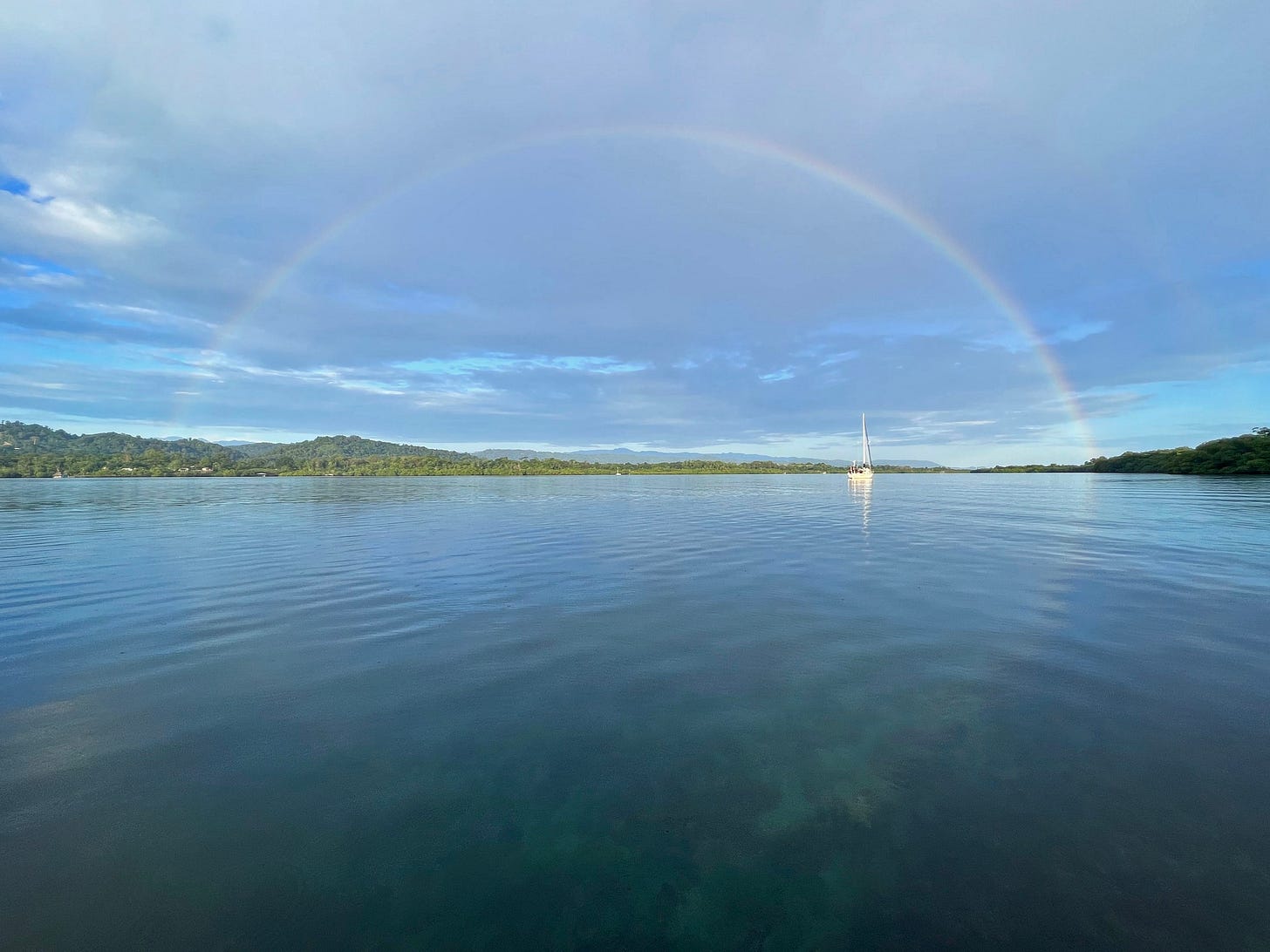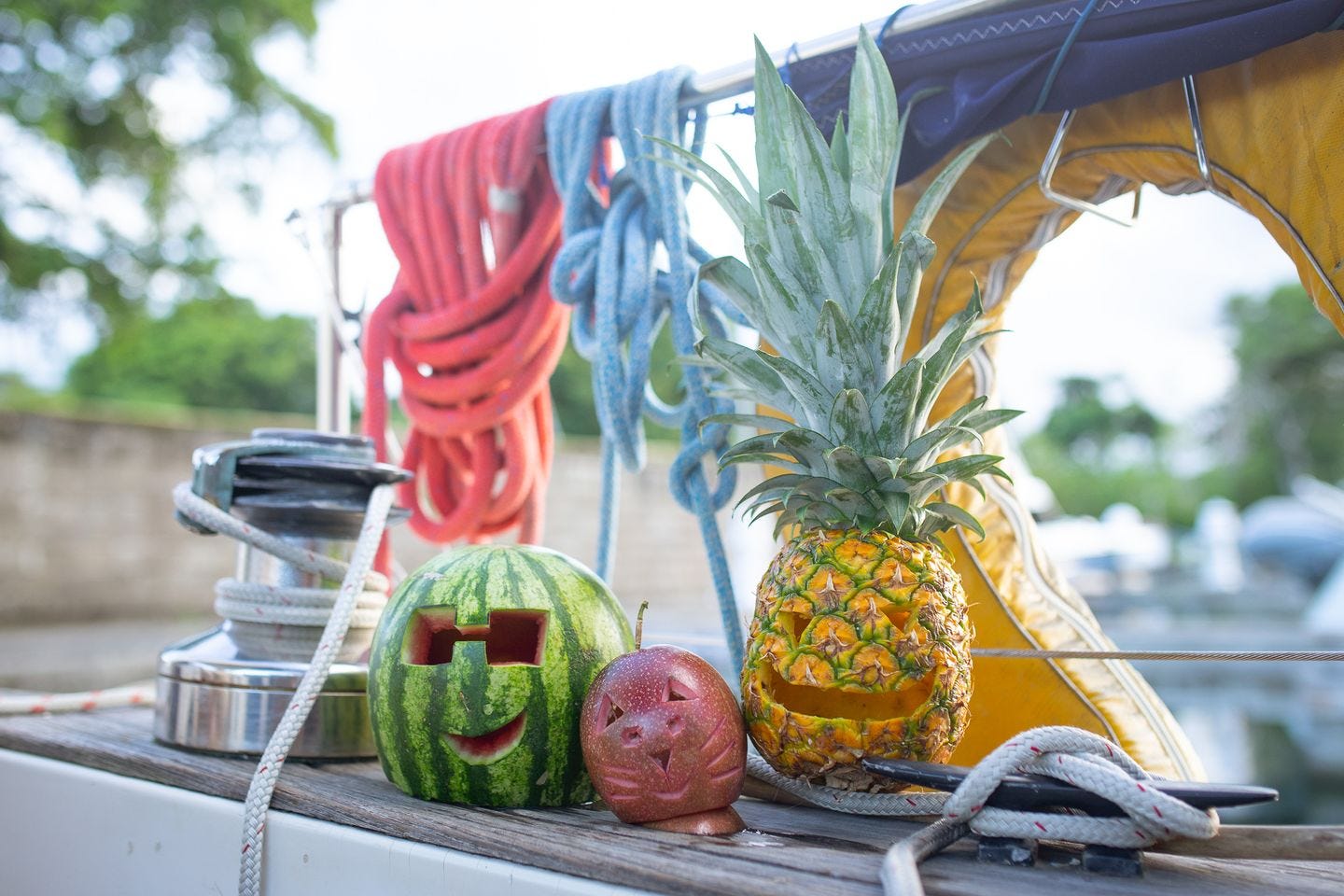This is Clouds Form Over Land, weekly writing about resilience, imperfectionism, and our relationship to the earth.
A stout sailing vessel may be the pot of gold at the end of the self-sufficiency rainbow.
Our desalinator transforms the sea into water we can drink. Solar panels turn photons into functional electronic instruments. Refrigeration extends the life of produce and expands my happiness with cold water and kombucha. Our satellite phone enables communication with anyone in the world, so long as we saved their contact info before losing cell coverage. The sails ride the wind and the diesel engine kicks on for maneuvering in close quarters and rare times when we are on a schedule.
Collection and transformation are crucial for making the jump from day sailor to voyager.
Wikipedia says self-sufficiency is “a state of being in which a person or organization needs little or no help from, or interaction with, others”. The thesaurus returns a grab bag including competent, closed, and conceited.
When preparing for an ocean voyage, this state of being is essential to the creative brief. When sailing miles offshore, there is rarely anyone to call for anything less than a catastrophe. Supplies and essentials are unknown, although it’s important to remember that everyone everywhere eats, most use diesel engines and outboard motors, and many are happy to help if asked.
The tricky gadgets that enable our self-sufficiency also link us back to community, to people spending time working with others, for others. All of these off-grid systems require specialized parts developed by specialized people. The everyday things link us too. We can only sail so far before needing to cross paths with a community growing food in soil or trucks coordinating pick-ups and drop-offs from a supply house.
William Shatner went to space in a ship and described it as the most profound experience of grief in his life. His words echoed a feeling I have had out in the big blue sea:
I discovered that the beauty isn’t out there, it’s down here, with all of us. Leaving that behind made my connection to our tiny planet even more profound. The contrast between the vicious coldness of space and the warm nurturing of Earth below filled me with overwhelming sadness. Every day, we are confronted with the knowledge of further destruction of Earth at our hands: the extinction of animal species, of flora and fauna . . . things that took five billion years to evolve, and suddenly we will never see them again because of the interference of mankind. It filled me with dread.
A couple weeks ago, the WWF reported that wildlife populations have decreased 69% since 1970. This is good grief about something that matters outside our lifetimes. Along our way, we’ve seen stunning ecosystems intwined with signs and stories of instability. Coral cover in the Caribbean has decreased 60% in recent decades, temperatures are rising, unusually high tides cover walkways.
I was considering the WWF report while paddling around when a turtle popped its head out of the water. 31% of wildlife from that benchmark date is still here fighting for survival.
It’s alluring to think that we alone can sustain ourselves, that we could be so secure in our personal ships. As people drop off the grid, they become closer to our collective reliance on other systems — rainwater, pollinators, soil, forests, food chains, weather patterns, air quality, specialty tools and parts, Wi-Fi, bookshelves, personal know-how.
Smithsonian scientists took cores of coral dating back 3000 years and discovered that reefs are healthier with an abundance of parrot fish munching and maintaining them.
We watched HBO’s House of the Dragon in a somewhat scholarly fashion as my sister guest-starred on the Radio Westeros podcast. One of the leads said “the sea offers an escape”. All these ships can survive extreme conditions by being untethered from anything solid. Journeys on them can remind us and heighten our awareness of all we have going for us when society holds together. Our time in vast waters has taught us that there are only short term escapes when trying to go alone. The credits usually roll as the ship dips over the horizon.
In the past few years, debates about individual and system solutions for climate change have shifted from paper straws and solar farms to lawn care and corporate accountability. Throwing one’s hands in the air about individual climate solutions, and especially personal restrictions, is tempting when the numbers roll on celebrities taking planes instead of cars and corporations polluting on a massive scale. As consciousness continues to rise on social issues, maybe it’s easier to tune out than absorb the next best practice.
Here I’d ask you to consider that your consumption is someone else’s celebrity.
North Americans’ CO2 emissions per capita are the highest in the world, 5.5 times higher than here in Panama. China’s are half, which is stunning considering how many of our emissions we offload to their soil to create consumer goods, which are then pushed across the largest ocean using the dirtiest fuel sources.
I’m not interested in living a life with little help or interaction from others and I’ve learned it’s not even possible. Can we tap this grief and transform it to action without a trip to space?
Ship’s Log:
We carved jack o’ lanterns out of a watermelon, pineapple, and passionfruit to celebrate spooky season. All the “guts” were thrown in the blender for a tasty treat.
Initiate interconnectedness by asking for help or offering something specific.
Learn about a tradition or technique of your ancestors and practice it if time allows.
Take note of interconnections throughout your day. In your home, at the grocery, wherever else your day takes you.
Consider removing leaf raking from your to-dos and let them feed the soil. More info and options from Lauren at Floricult.
Written in the spirit of not letting what we can’t do get in the way of what we can.
Did you try any of these? I’d love to hear about it.
Dahlia’s Autumn Offerings
My teacher and friend announced her fall schedule. Joining her sessions is a highlight of my week. She teaches meditation as a way of resting in the present moment, reviewing the past to integrate and learn from it, and rehearse the future to prepare for it. Participating in her work is part of how I gained and sustain the gumption and energy to write.
6-week course on reclaiming your attention from the shiny vortexes of media. November 6 - December 16, sliding scale.
Psalm for the Wild-Built book club. November 14 and/or 21, by donation.
Thanksgiving week meditation sessions by donation.
Meditation over Zoom. Wednesdays 8-8:55 AM Pacific. Free.
Email dahlia@beloved.org to join her mailing list and inquire about participation.



Beautiful, profound, and yes, incredibly sad.